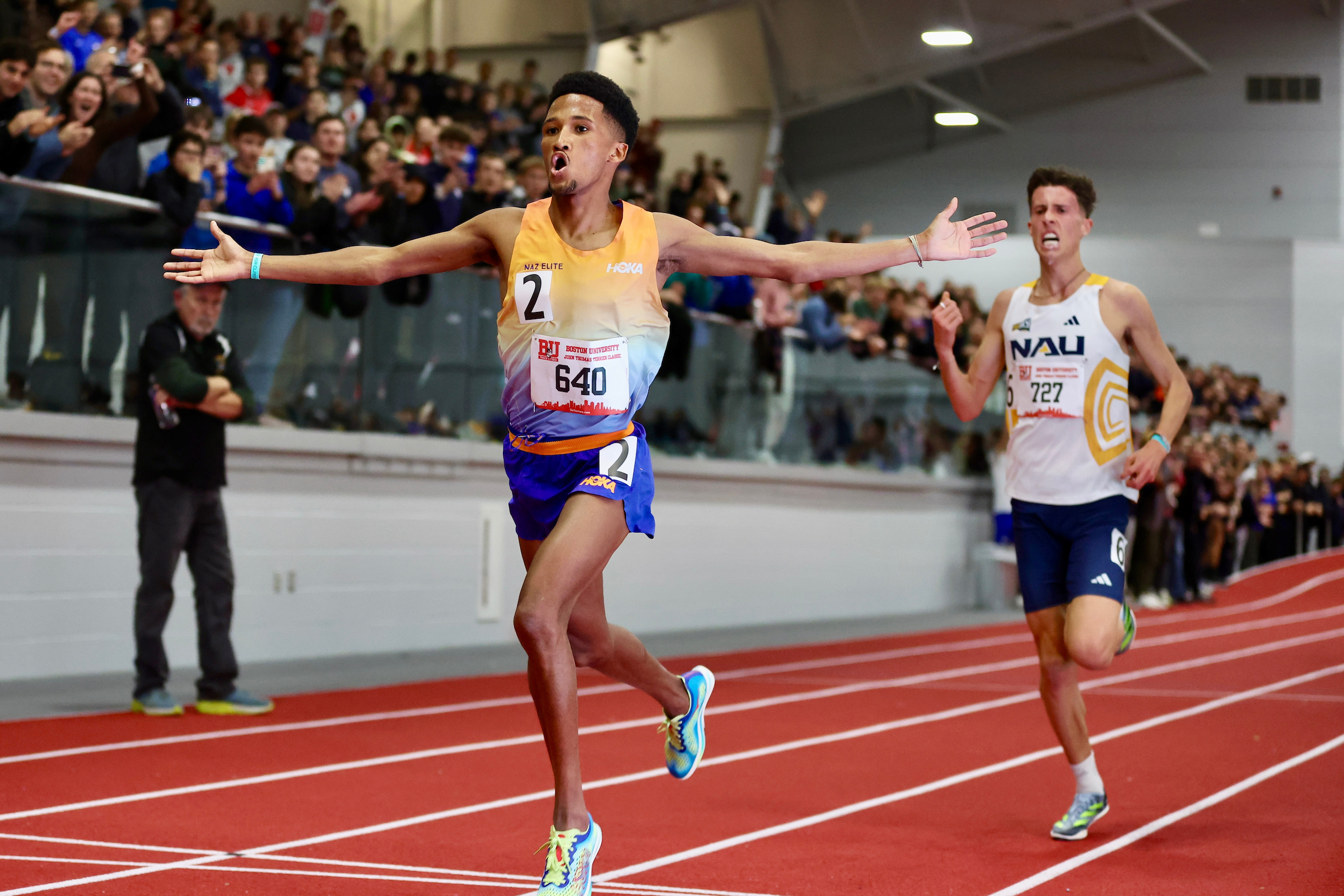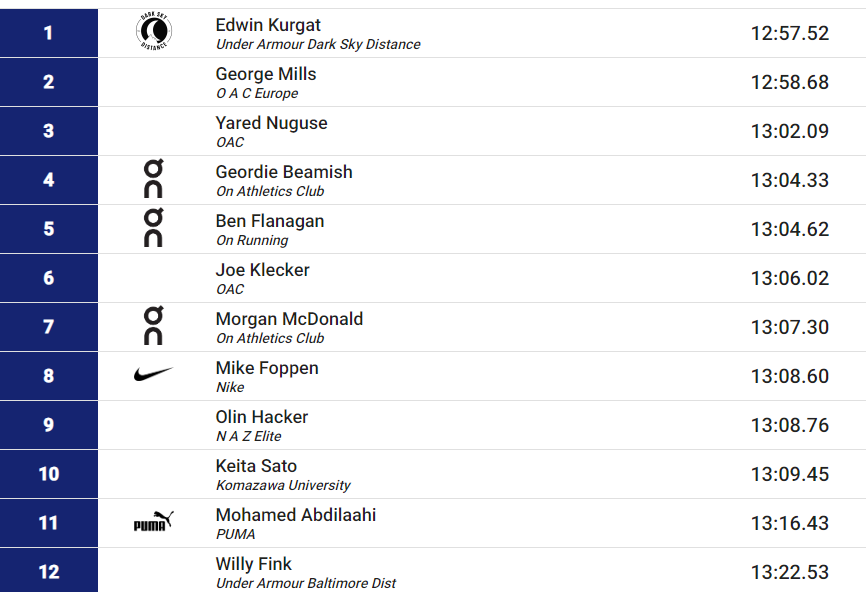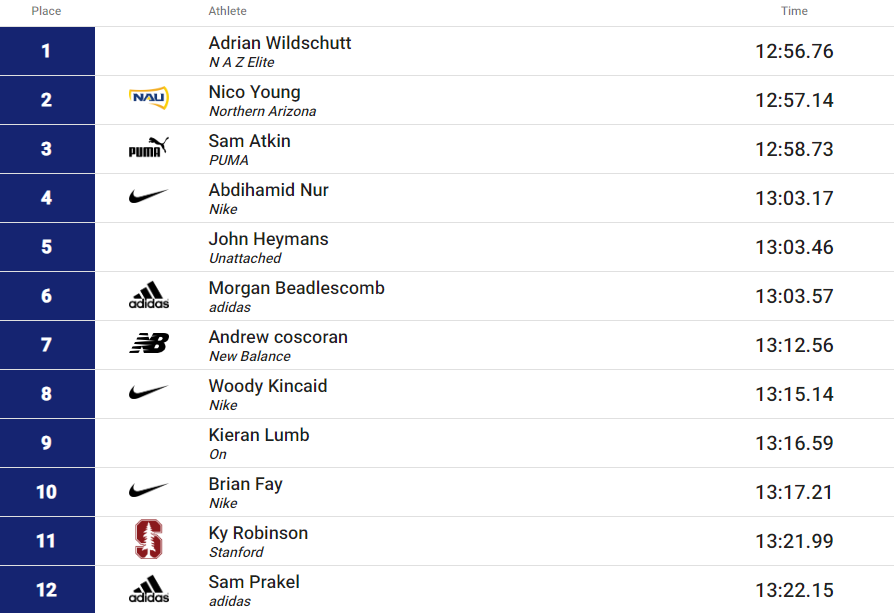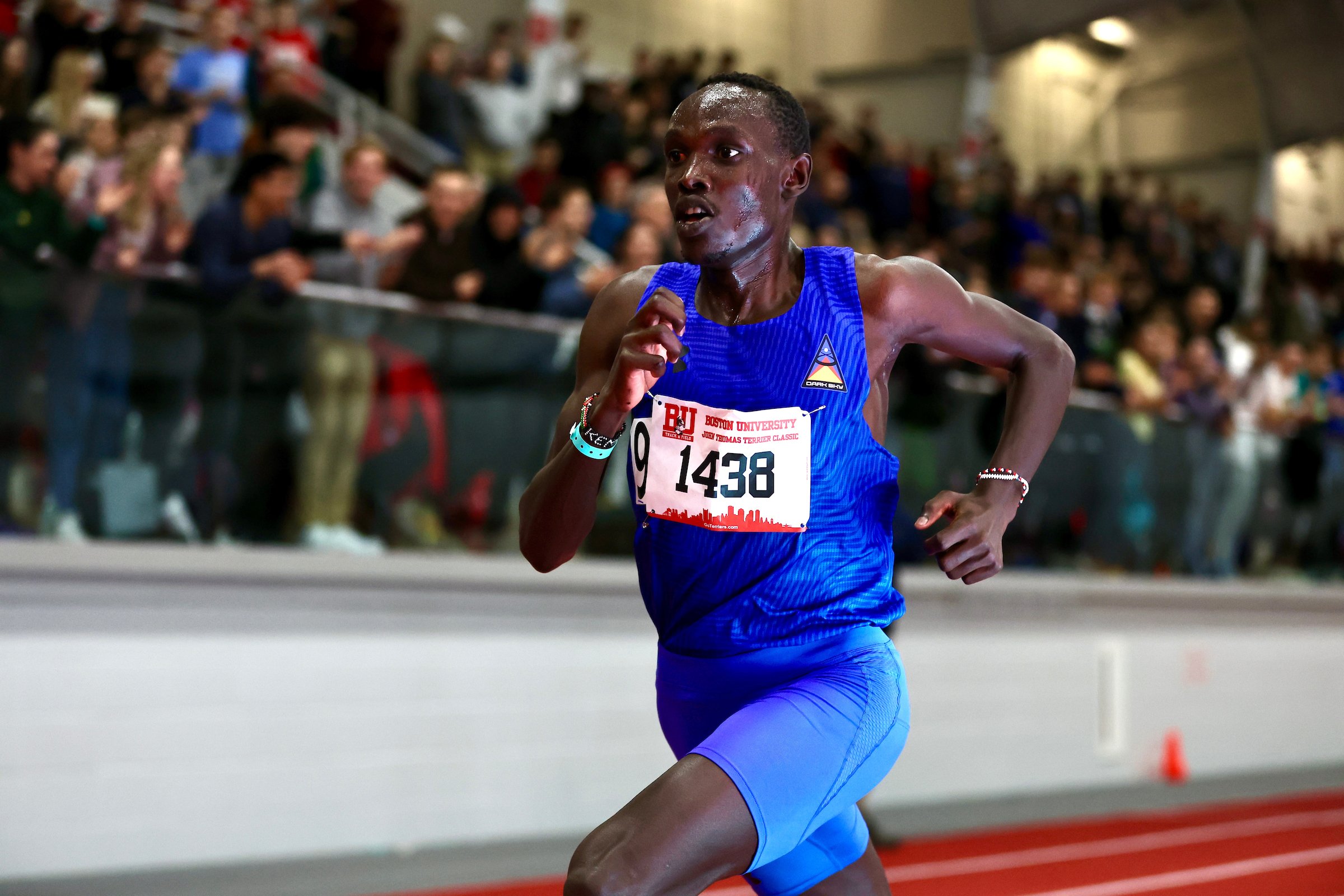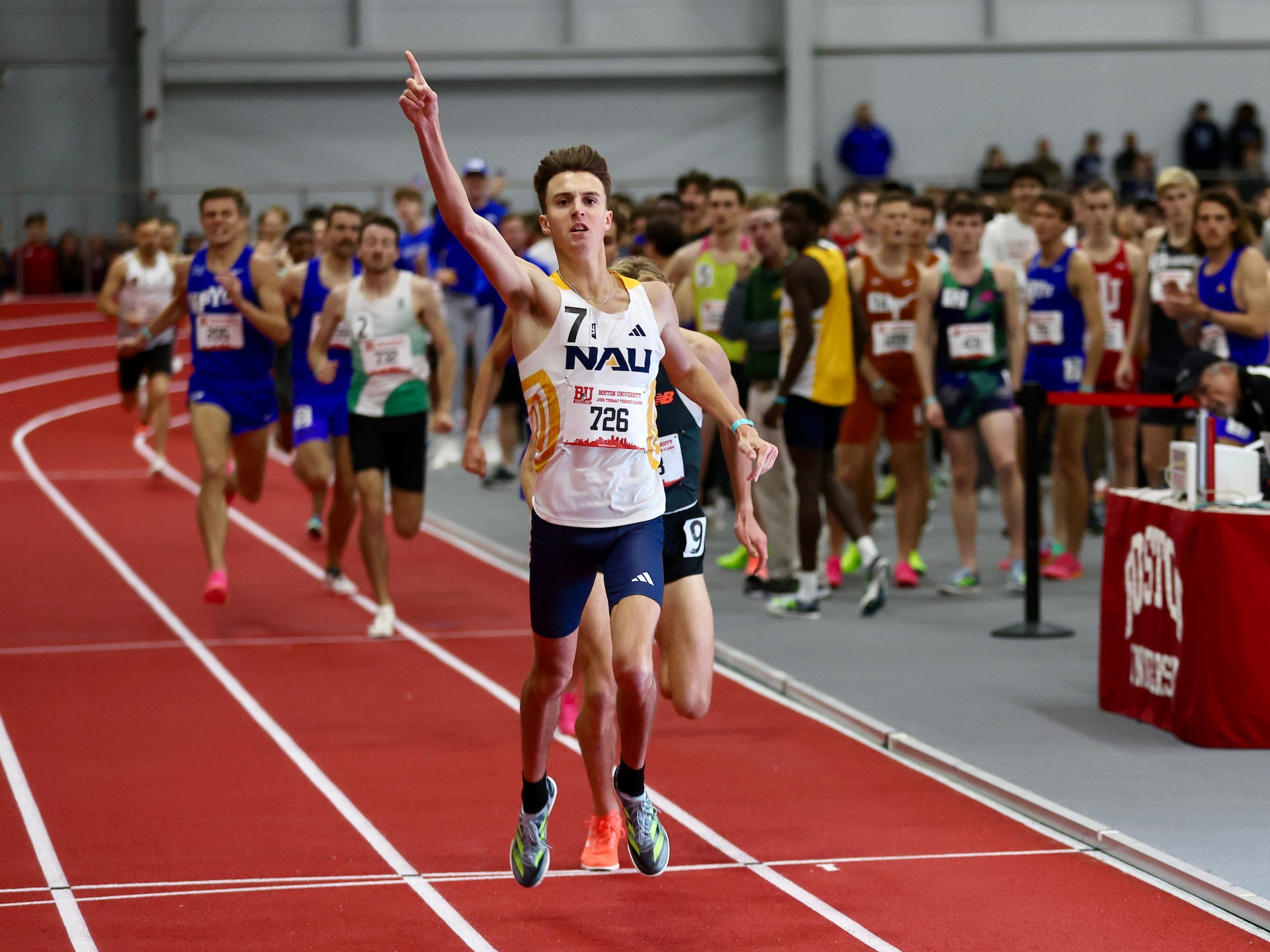2024 BU Terrier: Nico Young Runs 12:57 NCAA Record As Adrian Wildschutt & Edwin Kurgat Win 5Ks as
Yared Nuguse ran 13:02 in his first 5k in three years
By Jonathan GaultBOSTON – On a night when the men’s Olympic 5,000-meter standard of 13:05.00 was the focus, it was an athlete who already had the standard that ran the fastest at the 2024 John Thomas Terrier Classic at Boston University on Friday. Adrian Wildschutt of Hoka ONE ONE NAZ Elite who already had the standard by virtue of his 13:02 last summer, became the first South African man ever under 13:00 by running 12:56.76 to outsprint Nico Young of Northern Arizona University to win the White heat (the top two sections of the 5,000 were divided into two even heats, Scarlet and White).
Young made history of his own. His time of 12:57.14 smashed the collegiate record of Harvard’s Graham Blanks set on the same track eight weeks earlier and made Young the first collegian ever under 13:00. At 21 years, 184 days, Young is also the youngest American to break 13:00 by more than three years and is #7 on the all-time US list (#4 on the US indoor list).
Reigning US outdoor champion Abdihamid Nur was 4th in the White heat in 13:03.17, while his training partner Woody Kincaid, who set an American record of 12:51.61 at this meet last year, was a nonfactor in 8th (13:15.14).
2019 NCAA XC champ Edwin Kurgat, now running for Under Armour Dark Sky Distance, surprisingly won the Scarlet heat, which was held first, in 12:57.52. American mile record holder Yared Nuguse held the lead in that race with two laps to go but faded to 3rd in 13:02.09 (still a 38-second pb) as Kurgat and OAC Europe’s George Mills (12:58.68) went 1-2.
And how about a shoutout for Keita Sato who, just four days after his 20th birthday, ran 13:09.45 in the Scarlet heat to move to #2 on the all-time Japanese list?
In all, five men broke 13:00 and 11 ran under the 13:05 Olympic standard.
Earlier in the day, Colin Sahlman – who was Young’s teammate at Newbury Park High School and is now teammates with Young at NAU – won the mile in a pb of 3:53.17 as Craig Engels was 3rd in 3:54.03. Puma’s Jack Rowe won the 3,000 in a pb of 7:38.35.
Below, a few thoughts on the day’s action and top results.
Heat 1 Results
Heat #2 Results
Big runs for two unheralded Flagstaff-based pros
If you followed NCAA running in the past decade, you were familiar with Edwin Kurgat (2019 NCAA XC champion for Iowa State) and Adrian Wildschutt (2nd at 2020 NCAA XC for Florida State). They did not generate the same sort of buzz ahead of this race as the likes of Nuguse, Kincaid, Nur, and Joe Klecker so they deserve a lot of credit for showing up and beating two quality fields.
There are some similarities between the two runners. Both came to the US for college from Africa and both are now with Flagstaff-based pro teams. Wildschutt signed with HOKA NAZ Elite in the summer of 2022 after graduating from Florida State. It took the Kenyan Kurgat longer to find a pro deal, in part because he DNF’d his final NCAAs in June 2021 – at which point he was nearly two years removed from his NCAA XC title. After two years of training in Ames without a sponsor, he signed with Under Armour last summer and moved to Flagstaff to join the Dark Sky Distance group in November.
While both men enjoyed breakthroughs with their first sub-13:00s tonight, Wildschutt had come close in the past. In his first year with NAZ Elite in 2023, he ran South African records in the 3,000 (7:39), 5,000 (13:02), and 10,000 (27:23) but felt the missing piece was his closing speed – something that prevented him from winning an NCAA title in college (his best finishes: 2nd, 4th, and 4th). Wildschutt’s close tonight – he ran his final 200 in 27.23 – was evidence that his speed is improving.
While Wildschutt’s results have been strong, he hasn’t had the smoothest transition to the professional ranks as he was with former NAZ Elite coach Alan Culpepper for less than a year when Culpepper was replaced by Jack Mullaney in October. Wildschutt said he wasn’t sure how things would go under Mullaney as he had come to trust Culpepper, but he feels he is starting to build trust with Mullaney now too.
“Then I got to know Jack,” Wildschutt said. “I really like Jack right now and clearly we’ve been working on something that we both know that I need to focus on (his speed).”
Nico Young is blossoming into a star
From a US perspective, Nico Young was the big winner tonight. On a night when top American pros Yared Nuguse, Joe Klecker, Abdihamid Nur, and Woody Kincaid all took a crack at a fast 5,000, the collegian Young ran faster than all of them. Much faster, in fact – Young’s time of 12:57.14 was nearly five seconds faster than the #2 American tonight, Nuguse (13:02.09).
Young has had a spotlight on him since his senior year in high school in 2019-20, when he won the NXN title and ran a high school record of 7:56 for 3,000m at Millrose (he ran his final 3000 tonight in 7:40). Not everyone can go from a record-breaking high school athlete to record-breaking collegian, but Young, like his fellow 2020 high school grad Katelyn Tuohy, has done just that. He said it has not always been easy to deal with the pressure, but credited NAU coach Mike Smith for helping him to manage it and now he is thriving – no American has ever run this fast, this young.
Youngest Americans to break 13:00
| Athlete | Time | Date | Location | Age |
| Nico Young | 12:57.14 | 1/26/24 | Boston | 21 years, 184 days |
| Grant Fisher | 12:53.73 | 2/12/22 | Boston | 24 years, 296 days |
| Chris Solinsky | 12:56.66 | 6/4/10 | Oslo | 25 years, 181 days |
| Bob Kennedy | 12:58.75 | 7/8/96 | Stockholm | 25 years, 325 days |
Young is also the first collegian to break 13:00 and removed any confusion about the NCAA record. We don’t have to debate whether the record belongs to Graham Blanks or Lawi Lalang, who ran 13:00.95 in the summer of 2013 before returning to the University of Arizona last fall. Young has the 5,000m record, plain and simple.
“That is amazing,” Young said when told he was the first NCAA runner to go sub-13:00. “I’m super happy about that. It hasn’t sunk in yet.”
Young is now #1 on the NCAA performance lists in the mile (a converted 3:48.71), 3,000 (7:37.73), and 5,000. His next task: win his first NCAA title. He’ll get a shot across town at the TRACK at New Balance in March.
After the race, Young also revealed that he has only been running a few miles per day recently because of knee pain but that has not stopped him from running a 3:57 mile at altitude, a killer workout in Flagstaff, and now 12:57.
A Kiwi record for Geordie Beamish and welcome back, Morgan McDonald
Geordie Beamish’s focus should be on the steeple in 2024 after an incredible rookie year in that event that saw him finish 5th at Worlds last year. But his 13:04.33 tonight was an 8-second pb, got him the Olympic standard, and was the fastest ever by a New Zealand athlete, indoors or out. Beamish already had the indoor record but his time tonight was also better than Adrian Blincoe’s outdoor record of 13:10.19 from 2008.
Beamish’s OAC teammate Morgan McDonald came two seconds shy of the Olympic standard but considering the injury issues that have plagued him in recent years, today’s run marked a big step forward for the four-time NCAA champion and 2021 Olympian. McDonald ran 13:07.30 tonight, a big improvement on his 13:13.67 pb from 2021.
Not everyone will be happy about tonight
While Kurgat, Wildschutt, and Young ran incredible on Friday, a number of notable athletes were, to varying degrees, not as thrilled with their performances. Let’s run through a few of them quickly:
Yared Nuguse (3rd Scarlet heat, 13:02.09)
Nuguse’s coach Dathan Ritzenhein had told him before the race he thought he might be capable of running in the low 12:50s. He didn’t manage that but Nuguse actually said he felt pretty good about his performance overall – it merely confirmed what he already knew, that he does not like the 5,000.
“Now I know what I can do and I know I still don’t want to run it,” Nuguse said. “…Glad I got the Olympic standard, but no. Never again this year.”
Nuguse wasn’t quite ready to break 13:00 tonight but still PR’d by 38 seconds (this was his first 5k since 2021) and feels ready to attack the mile world record of 3:47.01 at Millrose on February 11 after running 3:47.38 there in 2023.
“I’m probably a little bit better than I was last year,” Nuguse said. “The race [tonight] may not have shown that but I feel like I am doing workouts a lot better than I had last year. I feel like in an event I’m more situated with and comfortable with, I could see myself doing something a little bit better than I did last year. So I’m really excited to see how that goes.”
Abdihamid Nur (4th White heat, 13:03.17)
Nur accomplished the main goal of hitting the Olympic standard and his time was also a personal best. It’s a little disappointing that the US champ was not able to mix it up for the win in his section, though, as this was a golden opportunity to break 13:00.
Joe Klecker (7th Scarlet heat, 13:06.02)
There’s no way to frame this run other than a disappointment for Klecker. He came to BU to run the Olympic standard and missed it by just over a second. That will hurt, particularly after running 12:54 in this race last year.
MB: IS OAC DONE?! Alright armchair coaches, let’s hear it. Why did OAC underperform tonight?
Woody Kincaid (8th White heat, 13:15.14)
After setting the AR with his 12:51 here last year, Kincaid was dropped by 3k and nowhere close to the standard. No one should be writing Kincaid off after one bad race, but this was one to forget.
Mario Garcia Romo (17th Scarlet heat, 13:57)
Lapped by more than half the field. This was Garcia Romo’s first 5k since college and based on tonight’s performance, he won’t be running another anytime soon.
Men’s mile: Sahlman runs down CPT for big pb
Canada’s Charles Philibert-Thiboutot, the Pan American Games champion and 2023 Worlds semifinalist at 1500, took the lead with a big move at halfway and by the bell looked to have the win wrapped up with a 1.5-second lead on the field. But Northern Arizona’s Colin Sahlman was not having it. Only 5th with 400 to go, Sahlman was up to 2nd at the bell and used a big 27.27 final lap (55.79 final 400) to run down Philibert-Thiboutot in the final straight and win in 3:53.17 to CPT’s 3:53.41. US pro Craig Engels was 3rd in 3:54.03 and also moved up well (27.43 last 200) but was too far back to contend for the win.
400m races pay off for Sahlman
Sahlman was the third-fastest high school miler ever, running a pb of 3:56.24 as a senior in 2022. He did not run a mile personal best during his freshman year at NAU last year but came on strong in the spring season and qualified for NCAAs in the 1500. Sahlman said he is in a much better spot now than he was at this point last year.
“Freshman year around this time, there were so many bumps in the road,” Sahlman said. “A lot of sudden sickness, injuries. This is probably one of the longest periods that I’ve gone without being sick or injured. Training has just been super consistent.”
Sahlman raced a 400 each of the previous two weeks in Flagstaff, running 49.38 and then 48.99. He said it was a different experience having to come from behind and race sprinters, but the goal was to really work on closing strong in the final 100 meters. And based on today’s race, it appears to be working. Sahlman had a large gap to overcome at the bell but his sensational final 100m won him the race.
“About two laps to go is when I really started thinking about the win,” Sahlman said. “I said I’m in a good position, I know I have trust in my close. And I capitalized on that.”
There’s been a lot of talk about altitude conversions recently after Sahlman’s teammate Nico Young ran a 3:57.33 mile at just under 7,000 feet in Flagstaff last week that was worth 3:48.71 according to the NCAA’s altitude conversion. It’s worth noting Sahlman ran 4:03.21 at that same meet, which was converted to 3:54.38 by the NCAA. He ran 3:53.17 today.
Men’s 3,000: Puma pros Rowe & Kemboi go 1-2
Puma pros Jack Rowe of Great Britain and Amon Kemboi of Kenya controlled much of this race but came under threat with 400m to go with South Carolina’s Anass Essayi moved to the lead. Essayi had the lead at the bell but both Rowe and Kemboi had something left as Rowe pulled away on the back straight to win in 7:38.35 (27.79 last 200) with Kemboi 2nd in 7:38.99. Essayi had to settle for 3rd in 7:39.00 to move to #8 on the NCAA all-time list. US steeple champion Kenneth Rooks, formerly of BYU, was 6th in his professional debut in 7:42.37.
Post-race interview with Rowe
Rowe, who ran for two years at the University of San Francisco from 2017-19, is based in the UK but has been training with Alistair and Amy Cragg’s Puma Elite Running team recently where he’s been working out with Kemboi in Albuquerque. His aim is to take a shot at the 13:05 Olympic standard in the 5,000 this season and said his run tonight – a four-second pb of 7:38 – was a good sign that he’s making progress toward that goal.
Kenneth Rooks was pleased with his pb; now he can get ready for his wedding
For a guy who has an 8:16 personal best in the 3000m steeplechase (despite falling during that race), Kenneth Rooks had not enjoyed a ton of success in the flat 3000m. He ran the event twice at Boston University in 2022-23 and ran 8:06 in the first race and 7:55 in the second.
Tonight’s race was a big improvement, and both Rooks and his coach Ed Eyestone were happy with the result. Rooks, who is still working toward finishing his civil engineering degree at BYU, does not have a big indoor season planned but wanted to get a race in before he gets married next month.
“I came off of winter break, I hopped in with a 12 x 1k workout with marathoners and I hung with Christian Allen (who was 6th at USA XC last week) the whole time,” Rooks said. “So I’m like, okay, I’m fit, I want to make sure I get a race in where I can utilize my fitness before I get married.”
Mission accomplished for Rooks, who also showed an impressive turn of speed – his 27.77 last lap was the fastest in the field. Up next? His wedding followed by a honeymoon on Catalina Island off the coast of California.
Talk about BU the action on our world-famous messageboard.
- MB: Official 2024 BU Terrier Classic Live Discussion Thread
- MB: Salhman 3:53.17 at BU
- NICO MF YOUNG NCAA RECORD 12:57, TAKES DOWN PROS AT BU
- IS OAC DONE?! Alright armchair coaches, let’s hear it. Why did OAC underperform tonight?
- nico young deserves this
- Nico vs. Graham at Indoor Nationals
- Has Mike Smith failed Nico Young? This thread from November didn’t age well.
